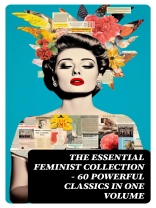The Essential Feminist Collection – 60 Powerful Classics in One Volume is a formidable anthology that explores the intricate and evolving landscape of feminist literature. It spans an impressive array of literary styles and genres, from the dramatic depth of Victorian novels to the poignant realism of early 20th-century narratives. This collection encapsulates the feminist consciousness through its selection of diverse and groundbreaking works. Standout pieces in the anthology take the reader through transformations in gender roles, societal expectations, and personal emancipation, reflecting an array of experiences and challenges faced by women across varying socio-cultural landscapes. The anthology brings together an esteemed assembly of authors and thinkers, whose works have significantly shaped feminist discourse. With contributors such as Charlotte Brontë, Virginia Woolf, and Sojourner Truth, among others, this volume reflects a tapestry of voices that helped to define and challenge the sociopolitical boundaries of their times. It aligns with pivotal literary movements such as romanticism and realism, providing a rich historical and cultural context that enhances the narrative of women’s struggle and empowerment. The pioneering contributions collected here transcend geographic and temporal boundaries, weaving a narrative that is both extensive and enlightening. This anthology is highly recommended for those seeking to immerse themselves in feminist literature’s vast and dynamic landscape. It offers an unparalleled opportunity to engage with the myriad perspectives and styles of its esteemed contributors, presenting a comprehensive dialogue on the timeless themes of gender, power, and identity. The breadth of insight contained within these pages represents not just a historical account but an ongoing conversation, making it an invaluable resource for both academic study and personal reflection on the multifaceted journey towards equality.
Over de auteur
Henrik Ibsen, born on March 20, 1828, in Skien, Norway, was a towering figure in the realm of theatre, known as the ‘father of realism’. A trailblazer for modernist drama, Ibsen’s works often delved into the complexities of the human psyche and societal norms. Though he began his career influenced by romanticism, his pivotal turn towards realistic and often challenging subject matter paved the way for his enduring legacy. His famously controversial approach can be seen in his critical examination of Victorian morals, which extends to works included in ‘The Essential Feminist Collection – 60 Powerful Classics in One Volume’. Ibsen’s plays, including ‘A Doll’s House’, ‘Ghosts’, and ‘Hedda Gabler’, often presented strong female characters struggling against the constraints of society, making him an inadvertent champion of feminist literature. His meticulous construction of dialogue and in-depth character development have made his literature a cornerstone of theatrical study and performances worldwide. Ibsen’s literary style mirrored his belief that drama should challenge the audience, confronting them with harsh realities and moral dilemmas. He passed away on May 23, 1906, in Oslo, but continues to be revered as a pivotal playwright whose works are essential reading for those interested in the evolution of drama and the early feminist movement.












